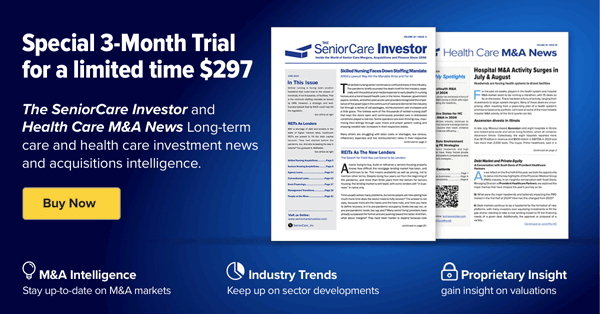There is no shortage of subsectors contributing to the overall double-digit percentage decline in healthcare M&A activity in 2023. According to the LevinPro HC database, there have been 1,299 healthcare M&A deals this year through July 31. This represents an 12% drop compared with the 1,481 transactions recorded during the same period in 2022. The 2023 total represents a 5% increase from the 1,240 deals posted in 2021 through July 31.
Some of the subsectors that have contributed to the M&A activity decline this year include Contract Development Manufacturing Organizations (CDMO), healthcare staffing firms, infusion services companies, primary & value-based care firms, specialty pharmacy organizations and revenue cycle management companies.
The specialty pharmacy category has experienced a dramatic decline in M&A activity this year. There were 21 transactions in the subsector last year through July 31 compared to nine so far in 2023.
“There are overall increased costs associated with new drugs, which might be pushed higher due to inflation [impacting the complexity of trials, more regulatory hurdles, investment in technology] and the professional costs associated with all of those naturally increase, too,” said Conor Duffey, vice president at Provident Healthcare Partners, a healthcare investment banking firm.
Hector Torres, managing director of the global healthcare team at DC Advisory, added, “limited resources across a wide range of initiatives, such as gaining accreditation and applying for limited distribution drugs.”
Infusion services is another subsector experiencing a drop in M&A activity. Through July 31 there were 15 infusion services deals completed in 2022. Through the same period this year the deal total is only seven.
“To the extent an investment is a new platform, then gaining access to the debt at desirable terms is a higher bar,” said Scott Davis, managing director at Provident Healthcare Partners. “Strategic acquirers typically have debt on hand, or if they need more they can increase an existing facility, which is easier than getting a new one.
“As is the case in all areas of healthcare, staffing is an important component to the infusion sector. The model calls for nurses to provide the care and there can always be difficulty recruiting/retaining them. Infusion models are either home-based or clinic-based and you need providers who are specifically looking for each of those models as it’s a much different experience. Some will utilize third-party staffing providers to fill gaps.”
There were no reported prices among the three deals in 2023. “The biggest challenge in healthcare today is a shortage of caregivers to provide services to the vast and growing patient populations,” said Andre Ulloa, partner/executive advisor at M&A Healthcare Advisors.
On Sept. 22, 2022, Pritzker Private Capital sold Cerritos, California-based KabaFusion, a home infusion company specializing in intravenous immunoglobulin, to Hellerup, Denmark-based Novo Holdings A/S, a private limited liability company wholly owned by the Novo Nordisk Foundation. The deal’s exact price couldn’t be confirmed, but a $1 billion-plus valuation was implied. Pritzker previously purchased KabaFusion in 2019 in a deal valued at approximately $250 million.
Also showing a deal drop is the staffing companies subsector, falling from 19 transactions in 2022 through June 23 to 13 during the same period this year. “Headwinds will come from rising wage inflation/labor cost for outsourced healthcare staffing providers, some of which will be mitigated by transferring the burden of this dynamic to the end-user customer, but this won’t mitigate the issue completely,” Torres said. “High valuations in this category will also temper M&A activity to a degree.”
Last year on May 16, Connetics USA, an international nurse and allied recruitment company that specializes in nursing and allied professional direct hire recruitment and placements, was acquired by AMN Healthcare Inc. for $78.76 million. Connetics USA serves clients across the U.S., including hospitals, dialysis facilities and long-term care facilities. AMN’s clients include acute-care hospitals, community health centers and clinics, physician practice groups, retail and urgent care centers, home health facilities, schools and other healthcare settings. During 2021, AMN’s consolidated revenue was $3.984 billion, a 66% increase over the prior year.
“Staffing is already a cyclical space that can be difficult to underwrite at times and there are many groups struggling to do this between the macro environment and the drastic swings within the staffing market itself,” Davis said.
CDMOs experienced a greater than 50% reduction in activity, with eight deals posted this year through June 23 compared with 17 transactions during the same period in 2022. There have been no reported prices for the CDMO deals so far this year.
On Aug. 9, 2022, Mayne Pharma Group Limited sold Metrics Contract Services, which has a 333,000-square-foot facility in Greenville, North Carolina. Catalent, Inc., a contract research organization that offers development services, delivery technologies and supply solutions for drugs and biologics, made the purchase for $475 million.
Also producing a deal shortfall this year compared with 2022 levels is the revenue cycle management subsector, with 37 transactions in 2023 through July 31. This compares with 43 deals during the same time frame in 2022.
“This is part of a larger trend of a slowdown in software investment, as broader SaaS acquisitions have continued to slow and valuation multiples for publicly traded companies have compressed,” Torres said. “RCM acquisitions will weather the software M&A slowdown better than many other SaaS verticals. Companies providing consumer and discretionary software services will struggle through a potential recession more than those offering software-enabled revenue cycle management services to the healthcare provider universe.”
The top end of the revenue cycle management M&A market reveals a dramatic decline in terms of purchase prices. E&A Medical Billing Service and Software, a Phoenix-based medical billing specialist firm that has been in business for more than 40 years and recorded 12-month revenues of $3.3 million, was acquired on April 24, 2023, for $2.7 million by Vancouver-based Kovo HealthTech Corporation. Kovo is a healthcare technology company that specializes in Billing-as-a-Service, offering SaaS-style recurring revenue contracts and software for U.S. healthcare clinics, hospitals and private practices.
In a sharp contrast, Atlanta-based Cloudmed, a healthcare technology company focused on revenue intelligence and data-driven insights that partners with over 3,100 healthcare providers in the U.S. and recovers more than $1.5 billion of underpaid or unidentified revenue for its clients annually, was acquired on Jan. 10, 2022, for $4.1 billion by Chicago-based R1 RCM Inc.
Experiencing a 70% deal activity decline so far this year is the primary/value-based care category, with only three transactions in 2023 through June 23. There were 10 such deals in 2022 during the same period.
Despite the data, a bullish sentiment persists regarding the subsector. A Bain & Company report from April stated that, “The longer-term outlook remains favorable. Value-based care stakeholders are doubling down on their commitment as healthcare spending outpaces GDP growth and CMS leans further into VBC models. This momentum is likely to accelerate as we see further regulation, more data from early adopters and more capability-enhancing technology.
“Many VBC models adopted to date benefit from heavy Medicare exposure where there is a large total addressable market, and where both payer-pull and the primary care relationships create opportunities for providers to inflect the cost curve.”
A December 2022 story from McKinsey & Company echoed this sentiment. “Providers specializing in value-based care have become attractive to investors because of the distinctive quality of care that they can provide and the investable opportunity they present, with a diversity of risk levels and business models,” the McKinsey report stated. “By building on a decade of increasing value-based payment adoption — combined with enhanced value-based capabilities across payers, providers, employers and other healthcare stakeholders — continued traction in the value-based care market could lead to a valuation of $1 trillion in enterprise value for payers, providers and investors.”
The primary/value-based care category has seen strength this year at the upper end of the category. Chicago-based Oak Street Health, a healthcare network of primary care centers for older adults on Medicare, was acquired by CVS Health on Feb. 8, 2023, for $10.6 billion in an all-cash transaction. Oak Street Health’s annual revenue for 2021 was approximately $1.4 billion, an increase of 62.29% from 2020 when $883 million was reported. CVS Health employs more than 300,000 people and has over 40,000 physicians, pharmacists, nurses and nurse practitioners.
This deal compares with the Nov. 7, 2022, acquisition of Summit Health-CityMD for $8.9 billion by VillageMD. Summit Health and CityMD merged in August 2019, creating Summit Health-CityMD, a provider of primary, specialty and urgent care. Summit Health and CityMD have over 2,800 providers across more than 370 locations in New York, New Jersey, Connecticut, Pennsylvania and Oregon. VillageMD, through its subsidiary Village Medical, is a national provider of value-based primary care services. VillageMD and Village Medical have grown to 22 markets and are responsible for more than 1.6 million patients.
“[Primary care is] the quarterback or point guard in the healthcare system, and when you have control over all these lives, you have the ability to refer into other specialties and other ancillary services,” said Craig Sager, director at Provident Healthcare Partners. “When you’re an investor there’s a lot of different ways you can play it or build out an organization or ecosystem around primary care that you can’t in a lot of other specialties or service lines.”
The contract research organization (CRO) and clinical trials subsectors matched M&A activity compared to the same period in 2022. There have been 22 CRO deals in 2023 through July 31. There were also 22 transactions during the same period last year.
“I think M&A activity will remain pretty robust,” said Kevin McDermott, a senior associate at Provident Healthcare Partners. The top end of the market is showing strength in 2023. Syneos Health, Inc., a CRO based in Morrisville, North Carolina, that in 2022 reported total revenue of $5.4 billion, was acquired by Elliott Investment Management, Patient Square Capital and Veritas Capital on May 10. The price was $7.1 billion, representing a 24% premium to Syneos Health’s unaffected closing stock price on Feb. 13, 2023.
This compares with the April 6, 2022, deal in which San Diego-based Explora BioLabs Holdings, Inc., which had annual revenue of approximately $38 million in 2021, was acquired by Wilmington, Massachusetts-based Charles River Laboratories International, Inc., an early-stage CRO. The purchase price was approximately $295 million in cash.
The data revealed a 27% rise in deal activity within the Clinical Trials subsector, with 14 transactions recorded so far this year compared with 11 in 2022 through June 23. Pittsburgh-based Immunetrics, Inc., which has served major pharmaceutical companies with predictive-modeling solutions to support the design of clinical trials, was acquired by Simulations Plus, Inc. of Lancaster, California, on June 20, 2023, for $15.5 million. Simulations Plus develops and sells drug discovery and development software for mechanistic modeling and simulation.
On July 17, 2022, in a transaction involving companies based in Israel, Novolog acquired a majority stake in Gsap Biomed for $9.9 million. Gsap Biomed is part of Gsap, an international consulting firm for healthcare companies. Gsap Biomed provides services to biomed companies including regulatory consulting, clinical trials, quality control and assurance. Novolog offers health logistics, technology home care and medical information solutions as well as technology tools in the digital platform for patients, doctors and medical institutions.
“M&A activity in the intermediate/long term will remain active, but is estimated to temper in the immediate term due to a finite universe of investment capital seeking to deploy funds in these categories relative to other segments of the U.S. healthcare ecosystem,” said Torres while commenting on the Clinical Trials, CRO and CDMO subsectors. “Valuations have always remained relatively high in these segments, so this factor also serves to limit private equity investment activity in particular, as the field of firms willing to invest at these valuation levels is finite compared to firms that have a wider investment mandate and/or thesis.”


